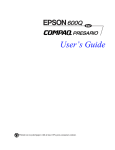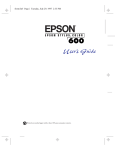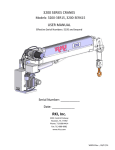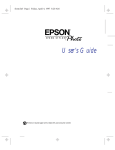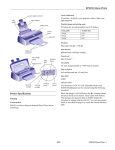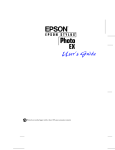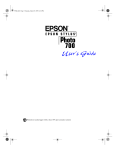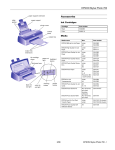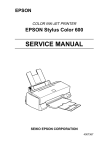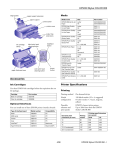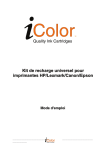Download Epson Stylus Color 600 Ink Jet Printer Product Information Guide
Transcript
EPSON Stylus COLOR 600 Printable columns and printing speeds paper support extension Raster graphics mode paper support printer cover edge guides Print quality Printable area Available dots CR speed 180 dpi 8.26 inches 1488 20 ips 360 dpi 8.26 inches 2976 20 ips 720 dpi 8.26 inches 5952 20 ips ips = inches per second control panel output tray Character mode output tray extensions Character pitch (characters per inch) Print columns Draft speed LQ printing speed 10 80 400 cps 200 cps 12 96 480 cps 240 cps 15 120 600 cps 300 cps 17 (10 condensed) 137 684 cps 342 cps 20 (12 condensed) 160 800 cps 400 cps cps = characters per second ink cartridge clamp paper thickness lever black ink out light paper out light color ink out cleaning power button button light Print direction Bidirectional with logic seeking for text and graphics. (Auto print direction can be set in the default-setting mode.) Control codes ESC/P 2™ and expanded raster graphics codes Line spacing 1/6 inch, 1/8 inch, or programmable in 1/360-inch increments Paper feed speed 66.6 milliseconds per 1/6-inch line Input buffer 32KB Fonts Bitmap fonts Printing Nozzle configuration Maximum 1440 dpi × 720 dpi load/eject button Printer Specifications Printing method Resolution On-demand ink jet Font 10 cpi 12 cpi 15 cpi Proportional EPSON Roman x x x x x EPSON Sans Serif x x x EPSON Courier x x x EPSON Prestige x x x EPSON Script x x x Select other font/pitch combinations using ESC/P 2 commands. Monochrome (black) 64 nozzles (32 × 2 staggered) Color (cyan, magenta, yellow) 32 nozzles × 3 Scalable fonts Font Minimum point size Maximum point size Increments EPSON Roman 8 32 2 EPSON Sans Serif 8 32 2 EPSON Roman T 8 32 2 EPSON Sans Serif H 8 32 2 Each font has four variations: normal, bold, italic, and bold italic. 1/97 EPSON Stylus COLOR 600 - 1 EPSON Stylus COLOR 600 Character tables These character tables are selected with the default-setting mode (see page 5 for instructions) or by using software commands. Character sets 14 international character sets and 1 legal character set ❏PC437 (U.S./Standard Europe) ❏PC850 (Multilingual) ❏PC860 (Portuguese) ❏PC861 (Icelandic) ❏PC863 (Canadian-French) ❏PC865 (Nordic) ❏Abicomp ❏BRASCII ❏Roman 8 ❏ISO Latin 1 ❏Italic Paper Paper type Size Paper types Thickness Weight Single sheets Letter (8.5 × 11 inches) A4 (210 × 297 mm) A5 (148 × 210 mm) B5 (182 × 257 mm) Legal (8.5 × 14 inches) Statement (5.5 × 8.5 inches) Executive (7.5 × 10 inches) Plain bond paper and special ink jet papers distributed by EPSON 0.003 to 0.004 inch (0.08 to 0.11 mm) 17 to 24 lb (64 to 90 g/m2) Transparencies, Glossy film, Glossy paper Letter (8.5 × 11 inches) A4 (210 × 297 mm) A6 (105 × 148 mm, glossy film only) Transparencies, glossy paper, and glossy film distributed by EPSON Glossy film and transparencies: 0.005 to 0.006 inch (0.13 to 0.15 mm) glossy paper: 0.0066 to 0.0070 inch (0.17 to 0.18 mm) Adhesive sheets A4 (210 × 297 mm) Self adhesive sheets distributed by EPSON Envelopes No. 109.5 × 4.1 inches (240 × 104 mm) DL8.7 × 4.3 inches (220 × 110 mm) C64.4 × 6.4 inches (114 × 162 mm) Plain bond paper or air mail paper 0.006 to 0.017 inch (0.16 to 0.43 mm) 12 to 20 lb (45 to 75 g/m2) Index cards A6 (105 × 148 mm) 5 × 8 inches (127 × 203 mm) 10 × 8 inches (254 × 203 mm) Ink jet cards distributed by EPSON 0.0091 inch (0.23 mm) 50.7 lb (188 g/m2) Note: Since the quality of any particular brand or type of paper may be changed by the manufacturer at any time, EPSON cannot attest to the quality of any non-EPSON brand or type of paper. Always test samples of paper stock before purchasing large quantities or printing large jobs. Poor quality paper may reduce print quality and cause paper jams and other problems. If you encounter problems, switch to a higher grade of paper. Do not load curled or folded paper. Ink jet paper, envelopes, glossy film, glossy paper, and transparencies are usable only under normal conditions: Temperature: 59 to 77 °F (15 to 25 °C) Humidity: 40 to 60% RH EPSON Photo Quality Glossy Paper and Photo Quality Self Adhesive Sheets should be stored under the following conditions: Temperature: 59 to 86 °F (15 to 30 °C) Humidity: 20 to 60% RH 2 - EPSON Stylus COLOR 600 1/97 EPSON Stylus COLOR 600 Printable area A A B-L B-R B-R B-L C Envelope C Single sheet Note: Always load paper into the sheet feeder short edge first. However, envelopes should be loaded long edge first. A: The minimum top margin is 0.12 inch (3.0 mm). When loading multiple sheets of EPSON Photo Quality Glossy Film, the minimum top margin is 1.2 inches (30 mm). B–L: The minimum left margin is 0.12 inch (3.0 mm). B–R: The minimum right margin for single sheet paper is 0.12 inch (3.0 mm) except for letter and legal size paper. The minimum right margin for letter and legal size paper is 0.35 inch (9.0 mm). C: The minimum right margin for envelopes is as follows: 0.28 inch (7 mm) for DL envelopes. 1.10 inches (28 mm) for No. 10 envelopes. 0.12 inch (3 mm) for C6 envelopes. The minimum bottom margin is 0.54 inch (14.0 mm). Ink Cartridge Specification Black ink cartridge (S020093) Color ink cartridge (S020089) Color(s) Black Cyan, Magenta, and Yellow Print capacity* 540 pages/A4 (ISO/IEC 10561 Letter Pattern at 360 dpi) 300 pages (A4, 360 dpi, 5% duty each color) Cartridge life 2 years from production date (if unopened) (within 6 months after opening package, at 77 °F (25 °C)) Storage temperature –4 to 104 °F (–20 to 40 °C) 1 month at 104 °F (40 °C) Transit temperature –22 to 140 °F (–30 to 60 °C) 1 month at 104 °F (40 °C) 120 hours at 140 °F (60 °C) Freezing temperature** 3.2 °F (–16 °C) –0.4 °F (–18 °C) Dimensions 0.7 (W) × 2.1(D) × 1.5 (H) inches 19.8 (W) × 52.7(D) × 38.5 (H) mm 1.7 (W) × 2.1(D) × 1.5 (H) inches 42.9 (W) × 52.7 (D) × 38.5 (H) mm * The print capacity may vary, depending on how often you use the print head cleaning function. Caution: To ensure good results, use genuine EPSON ink cartridges. Other products may cause damage to your printer not covered by EPSON’s warranty. ** It thaws and is usable after approximately 3 hours at 77 °F (25 °C). Don’t use an ink cartridge if the date on the package has expired. 1/97 EPSON Stylus COLOR 600 - 3 EPSON Stylus COLOR 600 Mechanical Interface Paper feed method Friction Paper path Sheet feeder, rear entry Sheet feeder capacity 100 sheets at 17 lb (64 g/m2) paper Your printer is equipped with an 8-bit parallel interface and a serial interface. Parallel interface Total print volume 75,000 pages (A4, Text) The built-in parallel interface has the following characteristics: Dimensions Storage Printing Weight Width: 16.9 inches (429 mm) Depth: 10.8 inches (275 mm) Height: 6.6 inches (168 mm) Forward channel Data format 8-bit parallel, IEEE-1284 compatibility mode Width: 16.9 inches (429 mm) Depth: 24.1 inches (613 mm) 27.4 inches (695 mm) when printing transparencies Height: 12.2 inches (309 mm) 7.7 inches (196 mm) when printing transparencies Synchronization STROBE Signal level TTL compatible Connector 57-30360 Amphenol connector or equivalent 11.5 lb (5.2 kg) without the ink cartridges Reverse channel pulse Handshake timing BUSY and ACKNLG signals Transmission mode IEEE-1284 nibble mode Electrical Specification 120V Model 220− 240V Model Input voltage range 103.5 to 132V 198 to 264V Rated frequency range 50 to 60 Hz Input frequency range 49.5 to 60.5 Hz Rated current 0.4A Power consumption Approx. 15W (ISO/IEC 10561 Letter Pattern) Adaptable connector 0.2A 57-30360 Amphenol connector or equivalent Synchronization Refer to the IEEE-1284 specification Handshaking Refer to the IEEE-1284 specification Signal level IEEE-1284 Level 1 device Data transmission timing Refer to the IEEE-1284 specification Note: Check the label on the back of the printer for the voltage of your printer. Serial interface Environmental The printer’s built-in serial interface is based on the RS-423 standard. This interface has the following characteristics: Temperature Operation: 50 to 95 °F (10 to 35 °C) Storage: –4 to 140 °F (–20 to 60 °C), stored in shipping container 1 month at 104 °F (40 °C) 120 hours at 60 °C (140 °F) Standard Based on RS-423 Synchronization Synchronous Bit rate Approx. 900 Kbps Handshaking X-ON/X-OFF DTR protocol Operation: 20 to 80% RH Storage: 5 to 85% RH (stored in shipping container, without condensation) Word format Data bit: 8 bits Parity bit: None Start bit: 1 bit Stop bit: 1 bit Connector 8-pin mini-circular connector Humidity Safety Approvals Safety standards UL 1950 with D3, CSA C22.2 No.950 with D3 EMC FCC part 15 subpart B class B, CSA C108.8 class B 4 - EPSON Stylus COLOR 600 Recommended cable 1/97 Apple System Peripheral-8 cable (Part number M0197) EPSON Stylus COLOR 600 Initialization Built-in Fonts and Character Tables The printer can be initialized (returned to a fixed set of conditions) in these ways: Hardware initialization ∗ The printer is turned on. ∗ The printer receives an INIT signal from the parallel interface. Software initialization ∗ Software sends the ESC @ (initialize the printer) command. The last panel settings are kept. Your printer has eight built-in fonts and eleven character tables that you can select using the printer’s default-setting mode as described below. The setting you choose takes effect each time you turn on the printer. Available fonts and character tables are listed on pages 1 and 2. Note: The font and character table selections you make with your software override the settings you make using the default-setting mode. For best results, use your software to make these settings. Hardware initialization When the printer is turned on, the printer mechanism is initialized, the input and print buffers are cleared, and all settings return to their default values. However, the printer mechanism is not initialized if the printer is turned on within 10 seconds after being turned off. In this case, the printer caps the print head, and ejects any paper in the paper path. To change the default font or character table, follow these steps: 1. Make sure the printer is turned off and paper is loaded in the sheet feeder. (Use paper at least 8.2 inches wide. Otherwise the print heads will spray ink directly onto the platen.) Software initialization Software initialization clears the print buffer and returns all settings to their default values, as shown below. 2. Hold down the R cleaning button and turn on the printer. The printer loads a sheet of paper and prints a brief summary and instructions. Default Settings 3. Follow the instructions on the sheet and press the R cleaning button until the control panel lights indicate the language of your choice. The table below shows the default settings that take effect when the printer is initialized. 4. Press the E load/eject button to print the default font and character table and the next page of instructions. Item Default Setting Top-of-form position Current paper position Page length Single sheets: 22 inches Left and right margins Cancelled Line spacing 1/6-inch line spacing 5. Select the font and character table you want to use. Character pitch Last font selected using default-setting mode Vertical tab position Cleared 6. Exit the default setting mode by turning off the printer. Horizontal tab positions Every eight characters Font selection Last font selected using default-setting mode Special printing effects Cancelled (except condensed and economy printing) User-defined character set Hardware/control panel initialization: cleared Software initialization: deselected only The instruction sheet lists all of the fonts and character tables you can select. If you want to check the current default font and character table, enter the default setting mode again and print the current settings, which are indicated by arrows. Note: You may exit default setting mode any time by turning off the printer. Any changes you made remain in effect until you change them again. 1/97 EPSON Stylus COLOR 600 - 5 EPSON Stylus COLOR 600 Using the Control Panel Buttons Control Panel Follow these guidelines when using the control panel buttons: P Turns the printer on and off. Resets the printer (clears its memory) if pressed twice within 10 seconds while the power is on. The four lights on your printer’s control panel show the printer’s status and alert you to problems like paper jams. S When the paper light comes on, your paper ran out or is incorrectly loaded. Load paper in the feeder and then press the E load/eject button. E Loads or ejects paper if pressed and released within two seconds. Resumes printing if pressed after a paper out error is corrected. R Moves the print head to the replacement position if pressed for about three seconds while the B or A ink out light is flashing or on. Returns the print head to its home position after ink cartridge replacement. Performs print head cleaning if pressed for about three seconds when the B or A ink out light is off. BA When an ink light comes on, you need to replace the ink cartridge. See page 14. BA When an ink light flashes, your ink supply is low. Make sure you have a replacement cartridge. Installing an Ink Cartridge for the First Time SBA When the paper light flashes and the ink out lights are on, you have a paper jam. Turn off the printer and gently pull out all jammed paper. Reload the paper, then press the E load/eject button. 1. Lower the output tray and raise the printer cover. P 2. Press the P power button to turn on the printer. The P power light flashes, the B and A ink out lights come on, and the ink cartridge holders move to the installation position. The power light is on when the printer is on. The power light flashes when the printer is receiving data or charging ink, or if you are replacing an ink cartridge or cleaning a print head. PSBA When the power and paper lights flash and the ink out lights are on, your printer has a carriage error. Press the P button twice to reset the printer. PSBA When all the lights flash, your printer may have an internal error. 6 - EPSON Stylus COLOR 600 3. Pull up the ink cartridge clamps. 1/97 EPSON Stylus COLOR 600 4. Open the ink cartridge packages. Remove the disposable yellow portion of the tape seal on top. Loading Paper 1. Slide the left edge guide all the way left and pull out the output tray extension. Caution: You must remove the tape seal from the top of the cartridge or you will permanently damage it. Don’t remove the tape seal from the bottom or ink will leak. 2. Fan a stack of plain paper and then even the edges. Warning: If ink gets on your hands, wash them thoroughly with soap and water. If ink gets in your eyes, flush them immediately with water. 3. Load the stack like this with the printable surface face up. Push the paper against the right edge guide. 5. Lower the ink cartridges into their holders with the labels face up and the arrows pointing toward the back of the printer. Note: Don’t load paper above the arrow mark inside the left edge guide. 6. Push down the clamps until they lock in place. 7. Press the R cleaning button to return the print heads to their home position and charge the ink delivery system. Charging can take up to five minutes, with the P power light flashing until its finished. 4. Slide the left edge guide back against the stack of paper. Testing the Printer Caution: Never turn off the printer when the P power light is flashing. You can run a printer check to determine whether the problem comes from the printer itself or the computer. ❏ If the results are satisfactory, the problem lies in software settings, the interface cable, or your computer. 8. Close the printer cover. ❏ If the printer check does not print correctly, you have a problem with your printer. Follow these steps to check the printer: 1. Make sure both the printer and computer are turned off. 2. Disconnect the interface cable from the printer. 1/97 EPSON Stylus COLOR 600 - 7 EPSON Stylus COLOR 600 3. Make sure paper is loaded in the printer. 2. Make sure your EPSON Stylus COLOR 600 printer is selected, and then click the Printer, Setup, Properties, or Options button. (You may have to click a combination of these buttons.) You see a dialog box like the following: Caution: Use paper that’s at least 8.2 inches wide. Otherwise the print head will spray ink directly onto the platen. Main tab 4. Hold down the E load/eject button and press the P power button to turn on the printer. Then release both buttons. The printer prints one page containing the printer’s ROM version, page count code, and a nozzle check pattern. The following sample is in black and white, but the actual printout is in color. W0186 02BB 5. After it prints the page, turn off the printer. Remember to reconnect the interface cable, then turn on the printer and your computer. 3. If you do not see the dialog box shown in step 2, click the Main tab. 4. Make sure the Mode option is set to Automatic. The printer software determines the best settings according to the Media Type and Ink settings you make. This is the easiest way to get good printing results for all kinds of documents, on all types of paper. Printing from Windows When you want to print from your Windows application, you click the print icon or choose Print from the File menu. You can then choose which pages to print, the number of copies, and other options. The settings that describe your print job— whether you want to use color or black ink, for example—are part of your printer driver software. 5. Choose the Media Type you want to print on from the following list (you may need to scroll through the list). If you are not sure which setting to select for your media, refer to the table on page 16. Setting Printer Options from Windows Applications ❏ Plain paper This section describes the preferences you’ll need to set for all your everyday printouts. ❏ Photo Quality Ink Jet Paper ❏ 360 dpi Ink Jet Paper ❏ Photo Quality Glossy Paper ❏ Photo Quality Glossy Film Note: The settings you select through your Windows application apply only until you exit that application. Then the driver settings return to the driver’s default values or the values selected through the Windows 95 Printer Properties or Windows 3.1 Control Panel. ❏ Ink Jet Transparencies The type of media you choose determines the print quality or resolution you can use. Note: For printing at the highest resolution (SuperFine quality at 1440 dpi), you need to use one of the photo quality media. For the best printing at any resolution, always use EPSON media. Follow these steps to check printer settings from your word processor or other Windows software: 1. Click the print icon or choose Print or Print Setup from the File menu. You see a printing dialog box. If you choose Print, you first see a Print dialog box that contains the settings you change most often, including the number of copies and the pages you want printed. 8 - EPSON Stylus COLOR 600 6. Choose Color or Black ink. If you are printing black text, a draft, or if you want colors to print as varying shades of gray, select Black for faster printing. 1/97 EPSON Stylus COLOR 600 3. Select Properties. Then click the Main tab. 7. Set the slider to Quality or Speed. This lets you choose between the highest resolution or the fastest printing for the media you’re using. (The slider is not available for certain media types.) You see the Main printer settings dialog box, as shown on page 8. 4. Change the settings you want and click OK. Once you’ve changed these basic settings as needed, check the Current Settings box on the bottom of the menu to see if the other settings are correct for your document. If you need to adjust them, use Advanced mode. Any changes you make will become the default settings for all your applications and documents. Setting Default Options in Windows 3.1 8. If necessary, click the Paper tab and choose your paper size, number of copies, orientation, and printable area. If your software application lets you control these settings, you don’t need to use the Paper tab. Follow these steps: 1. Double-click the Control Panel icon in the Main group. 2. Double-click the Printers icon. Note: To cancel your changes and exit the driver, click the Cancel button at the bottom of the menu at any time. 3. Select EPSON Stylus COLOR 600 from the list of printers and click Setup. You see the Main printer settings dialog box, as shown on page 8. 4. Change the settings you want and click OK. 9. Click OK when you’re finished checking your settings. The dialog box closes. Any changes you make will become the default settings for all your applications and documents. 10. In the printing dialog box, click Close, OK or Print. You may need to click a combination of these buttons. While your document is printing, the EPSON Despooler dialog box appears, showing the printing progress and the status of your printer. If you’re using Windows 95, this box also displays the Status Monitor. (See “Using the Despooler” on page 12 for more information.) Printing from a Macintosh Follow these steps to check printer settings from your word processor or other Macintosh software: 1. Choose Page Setup from the File menu. You see the Page Setup dialog box. Setting Default Printer Options When you change printer settings through your software application, the settings apply only to the application you’re using. If you want to adjust the default settings for all your Windows applications, you can access the dialog box through the Windows 95 Settings option or the Windows 3.1 Control Panel. 2. Choose your paper size and other page setup options and click OK. 3. Choose Print from the File menu or click the print icon in your application. You see a dialog box like the following: Make sure all your software applications are closed before you start. If not, you’ll have to close and then reopen them to have the new default settings take effect. Note: The settings you select using Windows apply to all your Windows applications, unless you change them for a particular application session, as described above. Also some application settings override driver settings (such as Paper Size or Orientation), so it’s a good idea to check the driver settings in your application too. Click to see list of media types Note: On the Macintosh, printer settings are saved with your document, but you can’t save them from one application to another. You’ll have to check your settings each time you print from a new application. If you want to reuse settings, you can create document templates for your favorite applications. Setting Default Options in Windows 95 Follow these steps: 1. Click Start, point to Settings, and then point to Printers. 2. Right-click the EPSON Stylus COLOR 600 icon. 1/97 EPSON Stylus COLOR 600 - 9 EPSON Stylus COLOR 600 4. Choose the number of copies and indicate which pages you want to print. Note: The drivers for the printers listed do not provide all EPSON Stylus COLOR 600 features, such as 1440-dpi printing, 720-dpi printing, and MicroWeave. 5. Make sure the Mode option is set to Automatic. The printer software determines the best settings according to the Media Type and Ink settings you make. This is the easiest way to get good printing results for all kinds of documents, on all types of paper. When printing black and color, select: EPSON Stylus Pro EPSON Stylus COLOR 500 EPSON Stylus COLOR II LQ-860 LQ-2550 Choose the Media Type you want to print on from the following list. The type of media you choose determines the print quality or resolution you can use. If you are not sure which setting to select, refer the table on page 16. ❏ Plain Paper When printing black only, select: ❏ 360 dpi Ink Jet Paper LQ-870/1170 LQ-500 LQ-570(+)/1070(+) SQ-870/1070 LQ-850 ❏ Photo Quality Ink Jet Paper ❏ Photo Quality Glossy Paper ❏ Photo Quality Glossy Film ❏ Ink Jet Transparencies Managing Print Jobs in Windows Note: For printing at the highest resolution (SuperFine quality at 1440 dpi), you need to use one of the photo quality media. For the best printing at any resolution, always use EPSON media. Your Windows printer software includes two management utilities: the Spool Manager and Status Monitor. ❏ The Spool Manager starts automatically when you send a job to the printer. It allows you to print in the background while you continue to work on your computer and to hold jobs to print at a later time. If you’re using your printer on a network, it also handles multiple print jobs that come in at the same time. 6. Choose Color or Black ink. If you are printing black text, a draft, or if you want colors to print as varying shades of gray, choose Black for faster printing. 7. Set the slider to Quality or Speed. This lets you choose between the highest resolution or fastest printing for the media you’re using. ❏ The Status Monitor, which is available only if you’re using Windows 95, also starts automatically when you send a job to the printer. It displays on your screen to alert you about printer and ink status. 8. Click Print when you’re finished checking your settings. If you chose background printing when you set up your printer, you can continue working while your document is printing. Note: The Status Monitor doesn’t appear if you’re printing over a network. Printing from DOS Most DOS software programs include software for EPSON ESC/P 2 printers. You need to select the correct printer software to take advantage of your printer’s advanced built-in scalable fonts and graphics handling. Using the Spool Manager The Spool Manager works like the Windows Print Manager. When you send a job to your printer, your printer software creates a temporary journal file, stores it in the C:\TEMP or C:\WINDOWS\TEMP folder or directory, and assigns it to a print queue. The software then sends the file to your printer at the right time. Most DOS programs require you to select from a list of printers to install the printer software. If EPSON Stylus COLOR 600 is not included in the list, contact your software manufacturer to obtain updated software. ❏ To open the Spool Manager while you’re printing, click the Spool Manager icon that appears on the Taskbar (Windows 95) or at the bottom of your desktop (Windows 3.1). If updated software is not available, pick the first printer available in the lists below. 10 - EPSON Stylus COLOR 600 1/97 EPSON Stylus COLOR 600 2. Open the Spool Manager. Note: In Windows 3.1, you may not see the Spool Manager icon if the Program Manager or current window is maximized. Make the window smaller to see the Spool Manager icon. 3. Choose Default Spool Directory from the Options menu. 4. In the dialog box, change the spool directory to the one you created in step 1. Then click OK. 5. Make sure EPSON Stylus COLOR 600 is selected, and then choose Setup from the Queue menu. The Queue Setup dialog box appears. ❏ To open it at any time, double-click the Spool Manager4 icon in the EPSON program group or folder. You see the Spool Manager window: 6. Make sure the spool directory is the one you created in step 1. Also make sure Use Print Manager for this port is checked. Then click OK. (If you are using Windows 95 and don’t see the Status Monitor when you print, make sure it’s unchecked.) menus queue journal file 7. Close Spool Manager. Using the Status Monitor The Status Monitor, available only if you’re using Windows 95, displays automatically when you send a job to the printer. However, you can use it at any time to see how much ink you have left. Follow these steps: The Spool Manager window displays the status of your print queues and journal files and lets you control them. Here are some of the things you can do: 1. Access the Main printer settings dialog box. ❏ Hold or release a queue 2. Click the Utility tab. You see the Utility menu. ❏ Send journal files to your printer over a network 3. Click the EPSON Status Monitor icon.You see the Despooler window with the Status Monitor at the bottom: ❏ Hold, re-queue, or delete a journal file ❏ Select the information you want to see in the Spool Manager window ❏ Prevent the Despooler popup window from appearing on your screen whenever you print ❏ Change your default spool directory Deleting a Stalled Print Job If you’re having trouble printing, it may be because of a stalled print job. Follow these steps to delete it so you can continue printing: 1. Open the Spool Manager as described on page 10. 2. Click on any print jobs marked Held, then open the Document menu and click Delete. 3. Click Yes. 4. Check the amount of ink you have left. For more information about the Despooler window, see the following sections. 4. Exit Spool Manager and try printing again. Changing the Default Spool Directory If you get an error message when you try to print, or printing is very slow, you can try changing your default spool directory. Follow these steps: 1. Make a directory on your hard disk where you want Spool Manager to store journal files, for example, C:\SPLTEMP. 1/97 EPSON Stylus COLOR 600 - 11 EPSON Stylus COLOR 600 Using the Despooler Managing Print Jobs on a Macintosh While your document is printing, the EPSON Despooler dialog box appears on your screen: Your Macintosh printer software includes two management utilities: Monitor2 and Status Monitor. ❏ If you’re using background printing, Monitor2 starts automatically when you send a job to the printer. It handles printing while you continue to work on your Macintosh and lets you track documents that are waiting to be printed. The name of the file you’re printing appears here Click to pause printing ❏ The Status Monitor alerts you to any problems that occur during printing. You can also use it at any time to see how much ink you have left. Click to restart printing Click to cancel printing Using Monitor2 The Monitor2 utility lets you continue to work on your Macintosh while your document is printing. However, background printing is slower and may also slow down your system. Note: If you don’t want the Despooler dialog box to appear each time you print, you can turn it off. To do this, start Spool Manager, open the View menu, and select Show Despool Popup; the checkmark next to the option disappears. If you want to use this utility, you need to turn on background printing in the Chooser and increase the memory allocation for Monitor2. Follow these steps: 1. Open the Chooser from the Apple menu and select the EPSON Stylus(EX) icon. Then click either the printer or modem icon. This dialog box shows the progress of your print job and the status of your printer. If you run out of paper while printing, for example, the Despooler warns you. You can use the buttons to cancel, pause, or restart your print job. 2. Under Background Printing, click On and close the Chooser. The Status Monitor at the bottom of the dialog box shows how much ink is left in your printer, along with these status icons: 3. To increase the memory allocated to Monitor2, select EPSON Monitor2 in the Extensions folder in your System folder. 4. Choose Get Info from the file menu. Checking the printer status. 5. Set the Memory Requirements to 2000K or 3000K, depending on your system’s available RAM. 6. While you’re printing, click the EPSON Monitor2 icon on the Application menu at the right end of the menu bar. You see a dialog box like the following: A printing error has occurred and your printer cannot print. Check your printer. The printer is ready to print. job currently printing The printer is currently printing. jobs queued for printing would appear here The ink level is low or empty; check the B or A ink out light on the control panel and replace the cartridge if necessary. Note: The Status Monitor appears only if you’re using Windows 95 and you’re not printing over a network. 7. You can select a job and cancel it or just use this window to track the printer’s progress. 12 - EPSON Stylus COLOR 600 1/97 EPSON Stylus COLOR 600 Using the Macintosh Status Monitor Network Printing on a PC You can use the Status Monitor to check the level of ink in your printer and to control the way your software warns you about printer problems. Follow these steps: You can use your printer on a network under Windows 95 or other network operating systems. The Spool Manager sends journal files from your computer to a shared directory on a network server. These files can then be printed from another computer attached to the printer. 1. Choose Print from the File menu or click the Print button in your application. You see the printer settings dialog box. 2. Click the Utility button. You see the Utility menu. First you need to install the EPSON Stylus COLOR 600 printer software on each computer that is going to print on the network. Then run Spool Manager and identify the shared directory to use for journal files. After you set this up on the system connected to the printer, you need to perform a similar procedure on each remote system on the network. 3. Click the Status Monitor icon. The software checks the amount of ink remaining in the printer and displays the Status Monitor window: Under Windows 95, you also need to specify the port and network path to the printer. Setting Up Your Journal File Directory Follow these steps to set up the computer connected to the printer and any other computers on the network: 1. On the computer connected to the printer, open the Spool Manager window as described on page 10. Click to control messages and warnings 2. In the Spool Manager window, double-click the queue you want to use for network printing. The Queue Setup dialog box appears. Click to recheck ink level 3. Click the Spool to remote printer button. 4. Click the Browse button and select the remote server directory that will receive journal files. 4. If you want to change printer messages and warnings, click the Configuration button. 5. On remote systems, open the Spool Manager window as described on page 10. You see the following dialog box: 6. In the Spool Manager window, double-click the queue you want to use for network printing. The Queue Setup dialog box appears. 7. Click the Remote Despool tab and then click the Printing from remote queues option. 8. Click the Browse button and select the directory you’re using for journal files on the remote server (selected in step 4). Setting Up Your Network Path in Windows 95 5. Choose the options you want and click OK. If you want to use your printer on a network running Windows 95, you need to set up the port and network path on the computer connected to the printer. Follow these steps: 1. Double-click My Computer. 2. Double-click the Printers folder. 3. Right-click the EPSON Stylus COLOR 600 icon and choose Properties. 1/97 EPSON Stylus COLOR 600 - 13 EPSON Stylus COLOR 600 4. Click the Details tab. 4. Press the R cleaning button and hold it for three seconds. 5. Click the Add Port button, then specify the network path to the printer and click OK. The print heads move slightly left and the P power light begins flashing. (The print heads return to their home position if you don’t proceed to step 5 within 60 seconds.) 6. Open the Spool Manager window as described on page 10. 5. Pull up the ink cartridge clamp. The cartridge rises up from its holder. (Although the illustration shows the color ink cartridge, the procedure is the same for replacing the black ink cartridge.) 7. In the Spool Manager window, double-click your printer’s queue. The Queue Setup dialog box appears. 8. Make sure the Use Print Manager for this port option is checked. Then click OK. ink cartridge clamp Replacing an Ink Cartridge When a B black or A color ink out light flashes, the indicated cartridge is low on ink. This is a good time to make sure you have a new cartridge. When the light stays on, the cartridge is empty and you need to replace it. Use these EPSON ink cartridges within six months of installing them and before the expiration date on the package: Black ink cartridge Color ink cartridge S020093 S020089. Caution: For best results, don’t replace an ink cartridge unless its ink out light is flashing or on. If ink runs out, you can’t continue printing, even if ink remains in the other cartridge. 6. Lift the cartridge out of the printer and dispose of it carefully. To ensure good results, use genuine EPSON cartridges and do not refill them. Other products may cause damage to your printer not covered by EPSON’s warranty. 7. Follow the steps in the next section to install the new ink cartridge. Installing the New Cartridge Removing an Empty Ink Cartridge Once you have removed the empty cartridge, you’re ready to install the new one. Follow these steps: You can replace a cartridge when the B black or A color ink out light is either flashing or on. Follow these steps: 1. Remove the new ink cartridge from its packaging. 1. Make sure the printer is turned on and not printing. 2. Remove the yellow tape seal as shown: 2. Determine which cartridge needs to be replaced. 3. Lower the output tray and raise the printer cover. Caution: If you press the R cleaning button when no ink out light is flashing or on, the printer cleans the print heads as described on page 18. If you need to replace an ink cartridge before the lights flash (because the ink is too old, for example) follow the instructions on page 15. black cartridge Leave the old cartridge installed until you are ready to replace it with a new one. Attempting to print without a cartridge installed can damage your printer. Caution: You must remove the tape seal from the top of the cartridge; leaving the tape on will permanently damage it. Do not remove the clear seal from the bottom of the cartridge; ink will leak out. Once you remove an ink cartridge, it becomes unusable and cannot be reinstalled. 14 - EPSON Stylus COLOR 600 color cartridge 1/97 EPSON Stylus COLOR 600 Replacing an Outdated Ink Cartridge Warning: If ink gets on your hands, wash them thoroughly with soap and water. If ink gets into your eyes, flush them immediately with water. If an ink cartridge is more than six months old, you may need to replace it. How can you tell? You may notice that your printouts don’t look as good as they used to. If print quality doesn’t improve after cleaning and aligning the print heads, you can replace one or both cartridges. 3. Lower the ink cartridge into its holder with the label facing up and the arrow pointing to the back of the printer. The larger cartridge (color) goes on the right, the black ink cartridge on the left. Follow these steps to replace an ink cartridge before the B black or A color ink out light is flashing or on: 1. Make sure the printer is turned on and not printing. 2. Lower the output tray and raise the printer cover. 3. Press the E load/eject button and hold it down for a few seconds until the print heads move to the left. Caution: To avoid damaging the printer, never move the print heads by hand. 4. Pull up the ink cartridge clamp. The cartridge rises up from its holder. 5. Lift the cartridge out of the printer and dispose of it carefully. 4. Press down the ink cartridge clamp until it locks in place. Caution: Don’t open the clamp or remove a cartridge except to replace it with a new one. Once you remove a cartridge, you can’t reuse it, even if it contains ink. 6. Follow the steps in the previous section, “Installing the New Cartridge,” to install the new ink cartridge. Using Special Media 5. If you need to replace the other ink cartridge, remove it as described in “Removing an Empty Ink Cartridge” on page 14. Then follow steps 1 through 4 in this section. When you print on special media, you need to be careful about choosing the correct Media Type and Paper Size settings in your printer software. Use the table on the next page to help you match the media type you loaded in the printer with the Media Type setting in the printer driver. 6. Press the R cleaning button and close the printer cover. The printer moves the print heads and begins charging the ink delivery system. (Even if you don’t press the button, ink charging begins 60 seconds after you close the clamp.) The type of paper or other media you use is one of the most important factors in determining the quality of your printed output. For example, you can achieve the highest resolution (SuperFine quality at 1440 dpi) only when you use EPSON Photo Quality media. The following tips will help you get the best results on any type of paper or other media. The P power light flashes and the printer makes various sounds. Charging takes about two minutes. When it’s finished, you can print again. Caution: Never turn off the printer while the flashing. P power light is 1/97 EPSON Stylus COLOR 600 - 15 EPSON Stylus COLOR 600 For this media name . . . Select this Media Type setting . . . Plain paper Plain paper Envelopes Plain paper EPSON 360 dpi Ink Jet Paper 360 dpi Ink Jet Paper EPSON 360 dpi, High Quality, and Photo Quality Ink Jet Paper You can load paper up to the arrow mark on the left edge guide. If you use legal-size ink jet paper, don’t load it more than half way to the arrow mark. EPSON Special Coated Paper for 360 dpi Printing EPSON High Quality Ink Jet Paper EPSON Photo Quality Ink Jet Paper EPSON Photo Quality Glossy Paper, Film, and Transparencies Photo Quality Ink Jet Paper To print on transparencies, remove the paper support and reinstall it in the rear paper support slot. For glossy paper and film, leave the paper support in the normal position. EPSON Special Coated Paper for 720 dpi Printing EPSON Photo Quality Ink Jet Cards EPSON Photo Quality Self Adhesive Sheets EPSON Photo Quality Glossy Paper Photo Quality Glossy Paper EPSON Photo Quality Glossy Film Photo Quality Glossy Film EPSON High Quality Glossy Paper EPSON Iron-On Transfer Paper EPSON Ink Jet Transparencies Ink Jet Transparencies Note: If the corresponding Media Type option for your paper is not shown in the Media Type list, change the Print Quality setting in the More Settings dialog box, select Automatic as the Mode setting, or change the predefined setting in the Advanced settings list on the Main menu. Before you load glossy media or transparencies, put a support sheet (packed with the media) or a plain paper sheet beneath the stack. You can load up to 20 sheets of glossy paper or up to 30 sheets of glossy film or transparencies. Caution: Don’t use the cleaning sheets that may be included with your special media; they may damage the printer. However, you may get better results by loading one sheet at a time. With multiple sheets loaded, the minimum top margin you can use is 1.2 inches. If you want to use a smaller top margin, load and print one sheet at a time. Letterhead, Pre-printed Forms, and Legalsize Paper Note: Use ink jet papers within one year of purchase. Use glossy media and transparencies within six months. Return unused sheets and envelopes to their original package as soon as possible. Always load the top edge first. If you are loading long paper, pull out the paper support extension and both output tray extensions. Don’t load it more than half way to the arrow mark on the left edge guide. 16 - EPSON Stylus COLOR 600 Remove each sheet from the output tray immediately after it’s printed. Make sure each sheet is dry before stacking it. 1/97 EPSON Stylus COLOR 600 Envelopes EPSON Iron-On Transfer Paper You can load up to 10 envelopes as shown below: You can print photos, company logos, or anything else you want on this paper, and then transfer your images to T-shirts or other cloth items. Load one sheet of transfer paper at a time. After you print, follow the instructions that came with the paper to iron the image onto the shirt or other item. Tip: For iron-on transfers, make sure you reverse your image before you print it, especially if it includes text. Then the text will read correctly when it’s transferred. You can use the Flip Horizontal option in your printer software. EPSON Photo Quality Self Adhesive Sheets Use these sheets to print labels or stickers. You should load these media one sheet at a time. Make sure your adhesive sheets are fully adhered to their backing sheet before you load them. Note: Be sure to load the envelope flap edge first and printable side up. Printer Care Cleaning the Print Heads If ink smears when you print on envelopes or other thick media, set the paper thickness lever to the + position. Open the printer cover and position the lever as shown below. Then close the cover and print. (Make sure you return the lever to the 0 position before you print on thin media.) If your printed image is unexpectedly light or faint, or dots are missing from the image, you may need to clean the print heads. This unclogs the nozzles so they can deliver ink properly. Cleaning the print heads uses ink, so clean them only if print quality declines. You can use either of the following to clean the print heads: ❏ The Head Cleaning utility in your printer software ❏ The printer’s control panel buttons. Using the Head Cleaning Utility Follow these steps to run the utility from a Windows computer or a Macintosh: 1. Make sure the printer is turned on but not printing, and the B black and A color ink out lights are off. EPSON Photo Quality Ink Jet Cards 2. Access the Main printer settings dialog box. You can use these cards to print photographs that look almost as good as the ones you get from film processing. 3. Click the Utility tab (Windows) or the Utility button (Macintosh). You see the Utility menu. You can load up to 30 cards at a time with a support sheet (packed with the cards) or a sheet of plain paper beneath the stack. When you’re ready to print, use your software to set the Paper Size option for the size card you’re using. 4. Click the Head Cleaning icon. 5. Follow the instructions on the screen to clean the print heads. Cleaning takes about two minutes, during which the printer makes some noise and the P power light flashes. When the P power light stops flashing, you need to run a nozzle check. If ink smears on the cards, set the adjust lever to the + position as shown above. 1/97 EPSON Stylus COLOR 600 - 17 EPSON Stylus COLOR 600 Caution: Never turn off the printer while the flashing. Caution: Load paper that’s at least 8.3 inches wide so ink doesn’t spray onto the platen. P power light is 6. Make sure paper is loaded in the printer and click Print nozzle check pattern (Windows) or Confirmation (Macintosh). See the section below for instructions on examining the nozzle check pattern. 3. Click the Utility tab (Windows) or the Utility button (Macintosh). You see the Utility menu. 4. Click the Print Head Alignment icon. 5. Follow the instructions on the screen to print a test page and select the correct alignment. If your print quality has not improved, repeat the steps above. Using the Control Panel Cleaning the Printer 1. Make sure the printer is turned on and not printing, and that the B black and A color ink out lights are off. To keep your printer working at its best, you should clean it several times a year, following these steps: 2. Press the R cleaning button and hold it for three seconds. Cleaning takes about two minutes, during which the printer makes some noise and the P power light flashes. 1. Turn off the printer, unplug the power cord, and disconnect the printer cable. Caution: Don’t touch the gears inside the printer. After the cleaning cycle is complete and the P power light stops flashing, you need to run a nozzle check. 3. Access the Main printer settings dialog box. Never use alcohol or thinner for cleaning; they can damage the printer components and case. 4. Click the Utility tab (Windows) or the Utility button (Macintosh). You see the Utility menu. Don’t use a hard or abrasive brush. 5. Click the Nozzle Check icon. See the next section for instructions on examining the nozzle check pattern. Don’t get water on the printer components. Don’t spray lubricants or oils inside the printer. If your print quality has not improved, repeat the steps above. 2. Remove all the paper from the sheet feeder. Examining the Nozzle Check Pattern 3. Carefully clean away dust and dirt with a soft, damp cloth. Examine the nozzle check pattern you print. It should look something like this, with the lower pattern colored cyan, magenta, and yellow: 4. Clean the exterior of the printer with a soft, damp cloth. Keep the printer cover closed so water doesn’t get inside. 5. Clean ink out of the printer’s interior with a soft, damp cloth. Information Reference List W0186B Each staggered horizontal and straight vertical line should be complete, with no gaps in the dot pattern. If your printout looks okay, you’re done. If any dots are missing, clean the print heads again, as explained in the previous sections. None Product Support Bulletins None Technical Information Bulletins None Related Documentation Aligning the Print Heads TM-STYCLR600 EPSON Stylus COLOR 600 Service Manual If your printouts contain misaligned vertical lines, you may need to align the print heads. Follow these steps: 1. Make sure the printer is turned on and paper is loaded. 2. Access the Main printer settings dialog box. 18 - EPSON Stylus COLOR 600 Engineering Change Notices 1/97 PL-STYCLR600 EPSON Stylus COLOR 600 Parts Price List 4006673 EPSON Stylus COLOR 600 User’s Guide 4006672 EPSON Stylus COLOR 600 Quick Setup


















